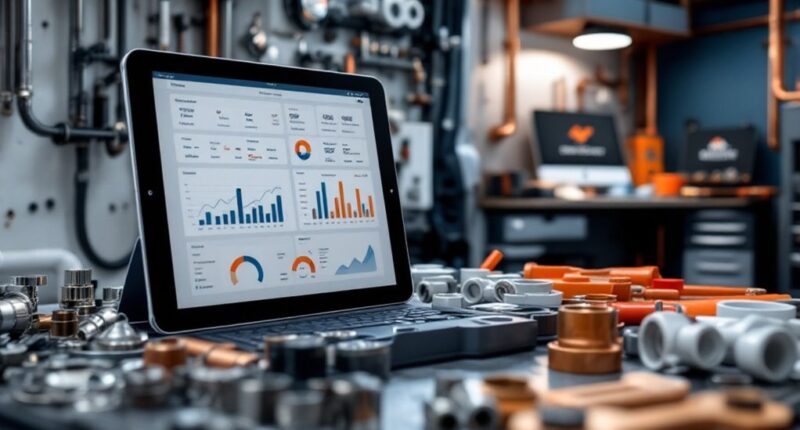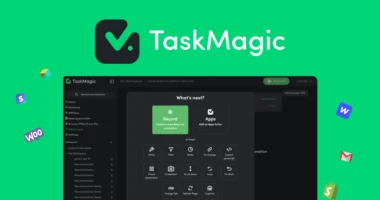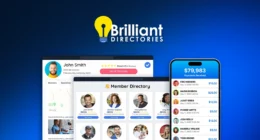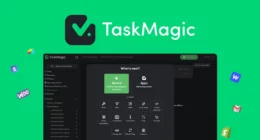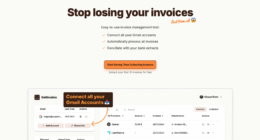Small plumbing businesses benefit substantially from specialized software solutions that streamline daily operations. These platforms automate essential tasks like scheduling, dispatching, and invoicing while providing mobile access for field technicians. Popular options like Housecall Pro, FieldEdge, and Service Fusion offer features including CRM capabilities, GPS tracking, and accounting integration. Digital automation can reduce operational costs by up to 20% and improve cash flow. Understanding the full scope of these solutions reveals their transformative potential for plumbing enterprises.
Quick Overview
- Housecall Pro and FieldEdge lead the market with user-friendly scheduling, dispatch tracking, and mobile payment processing for plumbing businesses.
- Cloud-based plumbing software automates scheduling, dispatching, and invoicing tasks, reducing operational costs by up to 20%.
- CRM features help manage customer relationships, automate follow-ups, and centralize client information for better service delivery.
- Integration with accounting platforms like QuickBooks streamlines financial operations and simplifies tax preparation.
- Mobile accessibility allows plumbers to access job details, process payments, and update work orders from the field.
Why Small Plumbing Businesses Need Software Solutions

How can small plumbing businesses stay competitive in today’s fast-paced digital marketplace? The answer lies in implementing modern software solutions that streamline operations and enhance customer service.
Small plumbing businesses face increasing pressure to operate efficiently while meeting customer expectations. Software solutions offer essential tools that automate scheduling, simplify dispatching, and handle invoicing with precision. The integration of quick quotes functionality helps businesses rapidly respond to customer inquiries and win more contracts. These digital systems help reduce costly manual errors while saving valuable time on administrative tasks.
With mobile access to job details and service histories, technicians can work more effectively in the field.
Most importantly, plumbing software enables small businesses to compete with larger companies by offering professional, automated customer communications, real-time updates, and streamlined payment processing. This technology-driven approach helps build trust, improve service quality, and maintain a strong market position in an increasingly digital industry.
Essential Features That Drive Plumbing Business Growth
Success in modern plumbing businesses depends heavily on selecting software with the right combination of vital features. The most impactful features include efficient scheduling systems that optimize technician routes, detailed job management tools for accurate cost tracking, and streamlined financial management capabilities that integrate with popular accounting platforms.
Small plumbing businesses particularly benefit from robust customer relationship management features that centralize client interactions and automate follow-ups. Mobile payment solutions enable real-time transactions and improve cash flow management for service providers. Additionally, reporting and analytics tools provide essential insights into business performance, helping owners make data-driven decisions.
These features work together to reduce operational costs, improve service delivery, and increase customer satisfaction. By implementing software with these core functionalities, plumbing businesses can establish stronger market positions and create sustainable growth pathways in an increasingly competitive industry.
Top Software Options in the Market for Plumbers

Today’s plumbing software market offers several robust solutions designed specifically for small business operations. Leading options include Housecall Pro, which excels in drag-and-drop scheduling and mobile payments, and FieldEdge, known for its extensive CRM and real-time dispatch tracking. With the U.S. plumbing industry reaching 113,347 businesses nationwide, software solutions have become essential for managing operations efficiently.
Service Fusion stands out by delivering enterprise-level features at small business prices, while Workyard specializes in precise job costing and GPS tracking. Jobber offers highly customizable tools with strong CRM capabilities. For businesses focusing on customer engagement, Broadly and NiceJob provide specialized solutions for reputation management and lead generation.
Each platform brings unique strengths:
- Housecall Pro: Best for efficient dispatch management
- FieldEdge: Excels in real-time tracking
- Service Fusion: All-in-one solution
- Workyard: Superior labor management
- Jobber: User-friendly customization
Maximizing ROI Through Digital Automation
Digital automation’s impact on plumbing businesses extends far beyond simple time savings, delivering measurable returns across multiple operational areas. Studies show businesses can achieve up to 20% operational cost savings through streamlined processes and reduced administrative overhead.
The ROI benefits materialize in several key ways:
- Faster payment cycles through automated invoicing
- Reduced inventory costs with smart stock management
- Higher job completion rates via efficient scheduling
- Improved customer retention through better service delivery
- Decreased labor costs from automated administrative tasks
Companies implementing plumbing software report up to 30% increased efficiency within six months. This improvement comes from eliminating manual processes, reducing errors, and enabling data-driven decision-making. Similar to how targeted advertising helps businesses reach specific audiences on LinkedIn, these digital solutions enable plumbing companies to precisely target and serve their ideal customer base. For small plumbing businesses, these gains translate directly into improved profitability and sustainable growth opportunities. Implementing route optimization features helps businesses minimize fuel expenses and travel time between job sites while maximizing the number of service calls completed daily.
Building Long-Term Success With Technology Integration

Building sustained growth in the plumbing industry requires more than just implementing digital tools – it demands an all-inclusive integration strategy that aligns technology with long-term business objectives. This involves creating a comprehensive plan that supports business expansion and sustainability over time. QuickBooks integration helps streamline financial operations and maintain accurate accounting records.
By leveraging cloud-based platforms and scalable software solutions, plumbing businesses can create a robust foundation for expansion. These systems seamlessly accommodate increased workloads while maintaining operational efficiency. The integration of multiple business tools into a unified platform streamlines management processes and supports strategic planning initiatives.
Key components for long-term success include:
- Automated administrative processes that free up staff time
- Centralized data management for improved decision-making
- Real-time financial tracking and analysis
- Mobile accessibility for field operations
- Detailed customer relationship management
This technological framework enables plumbing businesses to adapt to changing market demands while maintaining consistent service quality and operational excellence.
Frequently Asked Questions
How Long Does It Typically Take to Train Employees on Plumbing Software?
Training employees on plumbing software typically takes 1-4 weeks, depending on several key factors.
Basic software training usually requires 3-5 days, while advanced systems may need up to 3 weeks for complete mastery.
The duration largely depends on employees’ technical proficiency, software complexity, and training method used.
Hands-on workshops tend to be most effective, while online modules offer flexibility but may extend the learning period.
Most employees achieve peak performance after 2-3 weeks of regular use.
Can Plumbing Software Work Offline When There’s No Internet Connection?
Just like a squirrel storing nuts for winter, modern plumbing software comes prepared with offline capabilities. Most quality plumbing software can function without an internet connection, allowing technicians to:
- Access customer information and job details
- Record work notes and photos
- Process payments
- Collect signatures
- Use GPS navigation
When internet connectivity returns, the software automatically syncs all stored data to the main system, ensuring no information is lost during offline periods.
What Security Measures Protect Customer Data in Plumbing Software Systems?
Plumbing software systems protect customer data through multiple security layers. Advanced encryption safeguards information during transmission and storage, while role-based access control restricts data visibility to authorized personnel only. Two-factor authentication adds an extra security barrier, and regular system backups prevent data loss.
Additionally, extensive security measures include firewalls, routine security audits, and employee training on data protection protocols. Regular monitoring helps detect and prevent potential security breaches.
Are There Language Options Available for Multilingual Plumbing Teams?
Like a bridge connecting different shores, modern plumbing software seamlessly spans language barriers for diverse teams. Most platforms offer robust multilingual interfaces, typically including English, Spanish, and other widely-spoken languages.
Field technicians can access mobile apps in their preferred language, while administrative features enable document generation in multiple languages. The software’s translation capabilities extend to essential documents like invoices, work orders, and customer communications, ensuring smooth operations across linguistic boundaries.
How Do Plumbing Software Warranties and Refund Policies Typically Work?
Plumbing software warranties typically cover defects and functionality issues for 6 months to 3 years, including updates and technical support. Most providers offer workmanship guarantees for proper installation and integration, lasting 1-2 years.
Refund policies usually allow 14-30 days for full refunds if the software proves unsatisfactory. However, warranties and refunds often exclude user errors, unauthorized modifications, and third-party integration issues. Claims require proof of purchase and timely reporting.
Conclusion
Time-tested wisdom reminds us that “a craftsman is only as good as his tools,” and in today’s digital age, plumbing software has become an essential tool for success. By implementing the right technological solutions, small plumbing businesses can streamline operations, boost customer satisfaction, and achieve sustainable growth. Those who embrace digital transformation today position themselves to thrive tomorrow, turning efficiency into profitability while staying ahead of industry demands.
